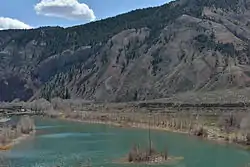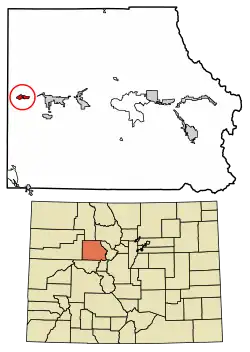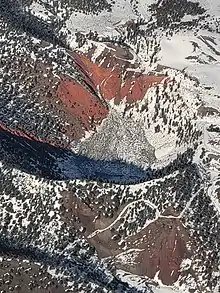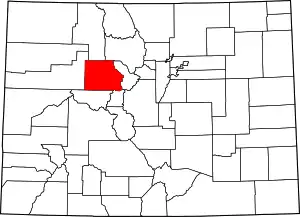Dotsero, Colorado
Dotsero is an unincorporated community and a census-designated place (CDP) located in and governed by Eagle County, Colorado, United States. The CDP is a part of the Edwards, CO Micropolitan Statistical Area. The population of the Dotsero CDP was 1,172 at the United States Census 2020.[3] The Gypsum post office (Zip Code 81637) serves the area.[4]
Dotsero, Colorado | |
|---|---|
 Confluence of the Eagle River and the Colorado River in Dotsero. | |
 Location of the Dotsero CDP in Eagle County, Colorado. | |
 Dotsero Location of the Dotsero CDP in the United States. | |
| Coordinates: 39°38′47″N 107°03′14″W[1] | |
| Country | |
| State | |
| County | Eagle County |
| Government | |
| • Type | unincorporated community |
| Area | |
| • Total | 1.551 sq mi (4.017 km2) |
| • Land | 1.356 sq mi (3.511 km2) |
| • Water | 0.195 sq mi (0.506 km2) |
| Elevation | 6,142 ft (1,872 m) |
| Population | |
| • Total | 1,172 |
| • Density | 760/sq mi (290/km2) |
| Time zone | UTC-7 (MST) |
| • Summer (DST) | UTC-6 (MDT) |
| ZIP Code[4] | Gypsum 81637 |
| Area code | 970 |
| GNIS feature[2] | Dotsero CDP |

History
Denver and Rio Grande Western Railroad
Dotsero was an important railroad junction point for the Denver and Rio Grande Western Railroad's Denver to Salt Lake City line. Originally the line passed through Dotsero following the Eagle River towards Tennessee Pass and through the Royal Gorge of the Arkansas River en route to Pueblo, Colorado before turning north towards Denver. Through the years, efforts were made to have a more direct connection between Denver and Salt Lake that did not require detouring through Pueblo. The Denver and Salt Lake Railroad (D&SL) built a line west from Denver and entered the Colorado River canyon near Bond, Colorado, about 40 miles (64 km) Northeast of Dotsero. The D&SL was never finished as a separate route to Salt Lake City; however, it was eventually acquired by the D&RGW, who built a connection between Dotsero and Orestod (Dotsero spelled backwards) near Bond. This connection, commonly known as the Dotsero Cutoff, was completed on June 15, 1934 and finally provided Denver with a direct link to Salt Lake City, making Dotsero the junction between the old and new routes to Denver.[5] After completion the old route over Tennessee pass remained in use as a secondary route, but has been dormant since 1997.[6]
Ferdinand Hayden published an extensive survey of central and southwest Colorado in 1877,[7] and used the location of the town of Dotsero as his "Dot Zero" (reference point) for his survey maps. The station name exists from the construction of the standard gauge railroad line to Glenwood Springs in the 1890s.
Geography
Dotsero is located at the confluence of the Eagle River with the Colorado River, along U.S. Highway 6 and Interstate 70, near the head of Glenwood Canyon, approximately 5 miles (8 km) west of Gypsum.
The Dotsero CDP has an area of 993 acres (4.017 km2), including 125 acres (0.506 km2) of water.[1]
Dotsero Volcano
Dotsero is built at the base of Colorado's most recently active volcano, the Dotsero Volcano, which, according to the United States Geological Survey, erupted 4,140 years ago.[8] The volcano is still classified as active by the USGS and is the only active volcano within Colorado.[9]
The main industry at Dotsero for years consisted of making cinderblocks from the volcano.
Demographics
The United States Census Bureau initially defined the Dotsero CDP for the United States Census 2010.
| Year | Pop. | ±% |
|---|---|---|
| 2010 | 705 | — |
| 2020 | 1,172 | +66.2% |
| Source: United States Census Bureau | ||
See also
References
- "State of Colorado Census Designated Places - BAS20 - Data as of January 1, 2020". United States Census Bureau. Retrieved December 21, 2020.
- "U.S. Board on Geographic Names: Domestic Names". United States Geological Survey. Retrieved December 21, 2020.
- United States Census Bureau. "Dotsero CDP, Colorado". Retrieved April 11, 2023.
- "Zip Code 81637 Map and Profile". zipdatamaps.com. 2020. Retrieved December 21, 2020.
- "Building the Dotsero Cutoff". ND Holmes. December 16, 2015. Retrieved March 18, 2016.
- "D&RG/D&RGW Tennessee Pass Route History". ND Holmes. July 28, 2011. Retrieved March 18, 2016.
- Atlas of Colorado, archived from the original on May 31, 2010
- America's Volcanic Past, USGS, archived from the original on September 23, 2006, retrieved August 13, 2006
- "Is there an active volcano in Colorado? 40 years after Mount St. Helens eruption, we found out". KUSA.com. May 18, 2020. Retrieved July 20, 2022.
